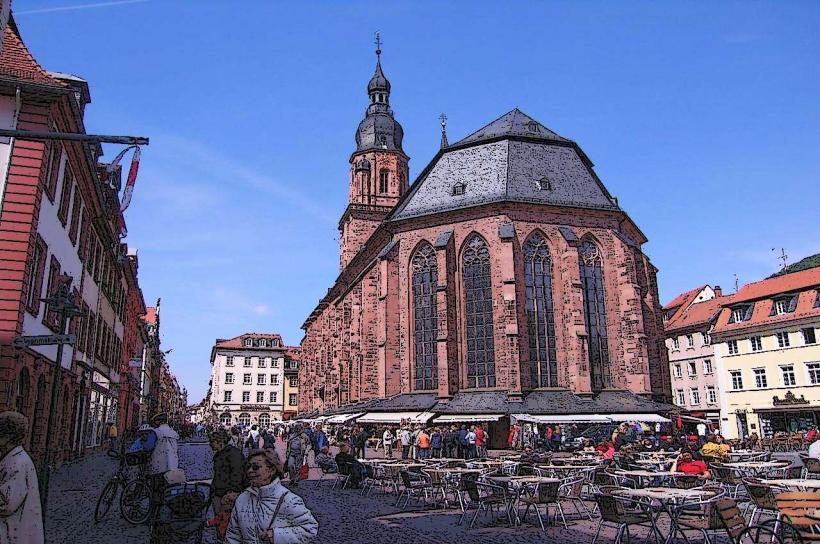Information
Landmark: Heidelberg UniversityCity: Heidelberg
Country: Germany
Continent: Europe
Heidelberg University, Heidelberg, Germany, Europe
Heidelberg University (Ruprecht-Karls-Universität Heidelberg) is one of the oldest and most prestigious universities in Germany and Europe. Founded in 1386, it has a rich history of academic excellence and has played a central role in shaping education, philosophy, and science in Germany and beyond.
History and Foundation
Founding
- Heidelberg University was founded in 1386 by Rupert I of the Palatinate, making it the oldest university in Germany. It was established with the goal of providing higher education in the fields of theology, law, medicine, and philosophy. The university quickly became a hub for intellectual discourse, attracting scholars from across Europe.
Medieval and Early Modern History
- During the Renaissance and the Baroque period, Heidelberg became an important center for academic and intellectual thought. The university played a significant role in the development of Humanism, and during the 17th century, it was influenced by the religious tensions of the Thirty Years’ War, with parts of the university suffering from military occupation and destruction.
- The university underwent a revival in the 18th century, with increased focus on the natural sciences, philosophy, and medicine.
Enlightenment and Philosophy
- The university’s association with notable figures such as Georg Wilhelm Friedrich Hegel, Karl Jaspers, and Max Weber helped cement its status as a major center for philosophical thought. The period of the Enlightenment saw Heidelberg emerge as a place for progressive thinking, especially in the fields of philosophy, theology, and history.
- Hegel, who taught at Heidelberg in the early 19th century, became one of the most influential philosophers in Western thought, contributing to the university’s intellectual reputation.
Academic Excellence
Fields of Study
- Heidelberg University offers a wide range of academic programs, with a strong emphasis on the humanities, social sciences, natural sciences, and medicine. The university’s faculties include theology, law, medicine, philosophy, mathematics, and natural sciences.
- It is particularly renowned for its medicine and life sciences programs, with a long history of research in the areas of biology, chemistry, and biomedicine. Heidelberg’s Medical Faculty is one of the largest and most respected in Germany.
- The university is also well-known for its interdisciplinary research in climate science, quantum physics, cancer research, and political science, drawing attention from the global academic community.
Research and Innovation
- Heidelberg University is a leader in research and innovation, regularly ranked among the top universities in the world. It is a member of the German Universities Excellence Initiative, which recognizes institutions for their high standards in research and teaching.
- The university is involved in numerous collaborative research projects, both within Germany and internationally. It has partnerships with leading institutions in Europe, the United States, and Asia, contributing to global advancements in scientific research and innovation.
Notable Alumni and Faculty
Heidelberg University has a long list of notable alumni and faculty members who have made significant contributions to various fields, particularly philosophy, medicine, and science:
Philosophers
- Georg Wilhelm Friedrich Hegel: One of the most influential philosophers of the German Idealist movement, known for his work on the phenomenology of spirit.
- Karl Jaspers: A prominent existentialist philosopher who had a major impact on modern existential thought.
- Hans-Georg Gadamer: A leading figure in hermeneutics, the study of interpretation, particularly in the fields of philosophy and literature.
Scientists and Nobel Laureates
- Otto Meyerhof: A Nobel Prize-winning physiologist who made pioneering discoveries in biochemistry.
- Otto Hahn: A chemist and Nobel laureate in chemistry for his work in nuclear fission.
- Max Born: A physicist and Nobel laureate for his work in the development of quantum mechanics.
- Albrecht Kossel: A biochemist awarded the Nobel Prize in 1910 for his work on nucleic acids and their role in genetics.
Other Influential Figures
- Max Weber, one of the founders of sociology and social science, taught at Heidelberg and became a key figure in shaping modern social theory.
- Heinrich Heine, a famous German poet and essayist, also studied at Heidelberg University.
Campus and Facilities
Location
- The university is located in Heidelberg, a picturesque city in the Baden-Württemberg region of southwestern Germany. The city is known for its beautiful old town, the iconic Heidelberg Castle, and its vibrant academic atmosphere.
- The university is spread across various campuses, with key sites located in both the city center and in areas around the outskirts of the city. Notable areas include the Neuenheimer Feld, which houses the university’s Medical Faculty, and the Altstadt (Old Town), where the university’s historical buildings and the Main Building are located.
Historical and Modern Buildings
- The university is home to a combination of historic buildings, such as the Old University Building (dating back to the 18th century), and modern research facilities, including laboratories, lecture halls, and student dormitories.
- The University Library is one of the largest and most comprehensive university libraries in Europe, with an extensive collection of books, manuscripts, and journals.
Student Life
- Heidelberg University is home to thousands of students from all over the world. The university offers a vibrant student life, with numerous clubs, organizations, and events available to engage in. Students can participate in a variety of activities ranging from academic discussions to outdoor events along the Neckar River.
- The Heidelberg Student Corps, a group of student fraternities, is also a significant part of university life.
International Collaboration
Global Partnerships
- Heidelberg University maintains strong international ties with universities and research institutions worldwide. It is a partner in various international research networks and collaborates on interdisciplinary projects in fields such as climate change, medicine, and the humanities.
- It is also part of the Heidelberg University International Graduate Academy (IGA), which provides opportunities for graduate students and researchers to engage in cutting-edge research across disciplines.
International Students
- The university attracts students from over 130 countries, making it a truly international institution. It offers a wide range of programs in English, particularly at the graduate level, to cater to students from abroad.
- Heidelberg also provides a comprehensive support system for international students, including orientation programs, language courses, and student services.
Conclusion
Heidelberg University stands as a symbol of academic excellence and intellectual tradition. With its long history, exceptional reputation, and continued contributions to research and scholarship, it remains one of the leading universities in Germany and the world. Its combination of historic significance, prestigious faculty, and cutting-edge research ensures that Heidelberg continues to shape the future of academia and science.







